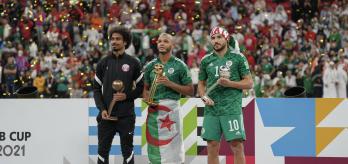"Today, your defensive game starts in the opponent’s box. Today, your attacking game starts in your own box," said Arsène Wenger, FIFA’s Chief of Global Football Development, as he discussed the evolution of the modern game as part of the Technical Study Group review of the group-stage action at the FIFA Arab Cup 2021.
"You need players all over the pitch who can attack and defend. We are looking at the personality of the players, those who work to defend. We need players to be everything, those players who sacrifice some of their talent to work for the team," said Wenger.
"One of the challenges of the modern coach-education system is to develop the personality and character of the players, because society does not do this anymore. We need to produce versatile players, but they need to be assertive and have character, resilience and accountability."
With the exceptions of Mauritania and Sudan, all of the African teams in this year’s competition have advanced to the knockout stages, and according to Michel Sablon, a FIFA instructor for the development of technical directors in Southeast Asia, this is testament to the standards across the CAF region.
"Many of the teams have also achieved this without their players who are based in Europe. That shows the talent that is coming through and how well the teams are being coached."
For our team of technical experts, Egypt’s last group-stage game against Algeria was one of the standout games of the tournament so far. Former Germany and USA national-team manager Jürgen Klinsmann was struck by the high level of intensity on show.
"They both had so much purpose to their play, you could tell this game really meant something. The quality was good, the tackling and challenges were intense. When they lost the ball, they wanted to win it back."
Out of possession
It should therefore come as no surprise that the six teams that spent the most time in a high press in the group stage all proceeded to the quarter-final stages (Table 2). Of the last eight, only Jordan and Oman ranked lower than the tournament average.
According to Sablon, "The way the coaches approach the games has been very interesting for us to observe. How teams press and how they react to losing the ball has come through strongly in our technical observations, and also in our data. There are some very special and talented players, and this adds extra value to the tournament."
However, the most frequent defensive strategies stemmed from mid- and low blocks (Table 1), which was a trend predicted by Sablon prior to the tournament. "Some of the region’s national teams aren’t used to applying a high press. When you watch the games, the teams tend to build up slowly and often set up in low and mid-blocks," he said.
And so it proved, with just over 32% of all out-of-possession game states being occupied by teams in these structures, with just 4.5% of the game states spent in a high press.
Sudan spent the highest % of time in a mid-block, while Algeria, Jordan and Morocco were also above the tournament average (Table 3).
Of the eight teams that spent the highest % of time in a low block, just two – Jordan and Oman – progressed to the last eight (Table 4). Klinsmann also noted how some teams approached the first halves of their games with a "do not lose" approach, preferring to play it safe rather than take risks.
"I think some teams need to play with more confidence. They have good players who are fit and have strong physicality but they sometimes preferred to drop back into a mid- or low block instead of counter-pressing to try to win the ball back."
Reaction to losing the ball
When we explore the compactness of the teams at the time of possession change, with the distances between their highest and deepest unit, it is evident that sides in the lower-left quadrant, who lost the ball close to their own goal, failed to get out of their group (Table 5).
Jordan were the notable exception in this respect, wilfully choosing to defend deep with the intention of counter-attacking through long balls, a style that proved successful enough to get them out of their group.
The positioning and compactness of Egypt and Morocco’s team shapes at the time of possession change were also indicative of their attacking approach to matches. Usually in the opposition’s half when they lost the ball, they maintained tight distances between their highest and deepest units, which directly affected their ability to counter-press high.
Tunisia, Oman and the UAE tended to leave the largest gaps between their units, which often left them vulnerable to counter-attacks through open spaces around their middle unit if their first defensive line was broken easily.
As the tournament now enters the quarter-finals, it is guaranteed that all teams will be asked more questions defensively. More work will be needed from players to win the ball back, and the pressure associated with knockout football will increase. The intensity of the games will also go up a level, as will the commitment needed to remain engaged for the whole 90 minutes. The crowds will also increase, as will the atmosphere.
One other thing for sure, according to Wenger, is that "The players with personality and a strong mentality will come out as the best in the tournament".





















